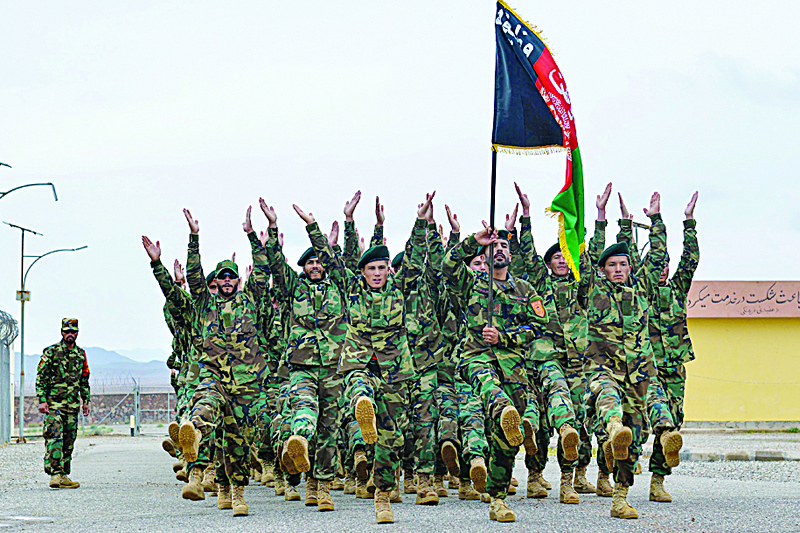 HERAT: Afghan National Army (ANA) soldiers march during a ceremony at a military base in the Guzara district of Herat Wednesday. - AFP
HERAT: Afghan National Army (ANA) soldiers march during a ceremony at a military base in the Guzara district of Herat Wednesday. - AFPKANDAHAR: The Taleban have captured Afghanistan's second-biggest dam after months of fierce fighting in their former bastion of Kandahar, the insurgents and officials said yesterday. Dahla Dam, which provides irrigation to farmers via a network of canals as well as drinking water for the provincial capital, was now under Taliban control, local officials told AFP.
"We have seized the Dahla Dam in Arghandab," Taliban spokesman Qari Yousuf Ahmadi told AFP. Haji Gulbuddin, governor of an adjacent district, confirmed the dam "is now in the control of the Taleban. "Our security forces... asked for reinforcements but they failed to get it," he said. The dam's capture comes after clashes erupted in neighboring Helmand province this week, just days after the US military formally began withdrawing its remaining troops from Afghanistan.
Kandahar water department chief Tooryalay Mahboobi told AFP the Taleban recently warned Dahla employees not to go to work. Last month the insurgents blew up a bridge that connected the dam to adjacent districts, an AFP correspondent in Kandahar said. Dahla was built by the United States nearly 70 years ago to provide water for irrigating land in about seven districts of Kandahar. In 2019 the Asian Development Bank approved a grant of nearly $350 million to be used partly to expand the reservoir-style project.
The surrounding district has seen intense fighting in the past six months, but officials announced in April that the area had been cleared. Before retreating, the Taleban planted explosives across the area-including in residential complexes-officials said. In neighboring Helmand, thousands of people have fled their homes in the face of a massive Taliban offensive against government forces. US warplanes have been providing air support for the Afghan forces despite the drawdown of foreign troops.
The United States was supposed to have pulled all forces out by May 1 under a deal struck with the Taleban last year, but Washington pushed back the date to September 11 -- a move that angered the insurgents. The pullout of foreign forces comes even as efforts to hammer out a peace deal between the Afghan government and the Taleban have stalled.
Meanwhile, a high-profile Afghan television journalist was shot dead in southern Kandahar city yesterday, officials said, a day after the Taleban warned against "biased reporting" by the media. Nemat Rawan was until last month a popular talk show host with the country's leading broadcaster Tolo News, before joining the ministry of finance as a communications specialist. He was "assassinated by unknown gunmen", Kandahar city police spokesman Jamal Nasir Barekzai said. "Heartbreaking to hear that a friend and former colleague Nemat Rawan was shot dead in Kandahar city today," Lotfullah Najafizada, head of Tolo News, posted on Twitter.
There was no claim of responsibility for the attack, but the Taleban have been blamed for a wave of assassinations targeting journalists in recent months. On Wednesday, a Taleban spokesman warned that media workers who carry out "biased reporting" would be "held responsible". Abdullah Abdullah, the head of the country's peace council, yesterday condemned the Taleban's threat against the media and "any attempts to silence Afghan journalists".
Members of Afghanistan's educated class-including journalists, activists and judges-have for months been the target of bombings and shootings, forcing many to go into hiding or leave the country. The killings have escalated since peace talks began last year between the Afghan government and the Taleban, sparking fears that the insurgents are eliminating perceived opponents as negotiations stall.
At least 11 Afghan journalists were killed in 2020, with four more reportedly murdered this year, according to a recent toll from Amnesty International. In early March, three female media workers were gunned down in the eastern city of Jalalabad. Around 1,000 Afghan media workers have left their jobs in the past six months, an Afghan journalists' safety committee said recently. Afghanistan has long been ranked as one of the most dangerous countries in the world for journalists. - AFP










